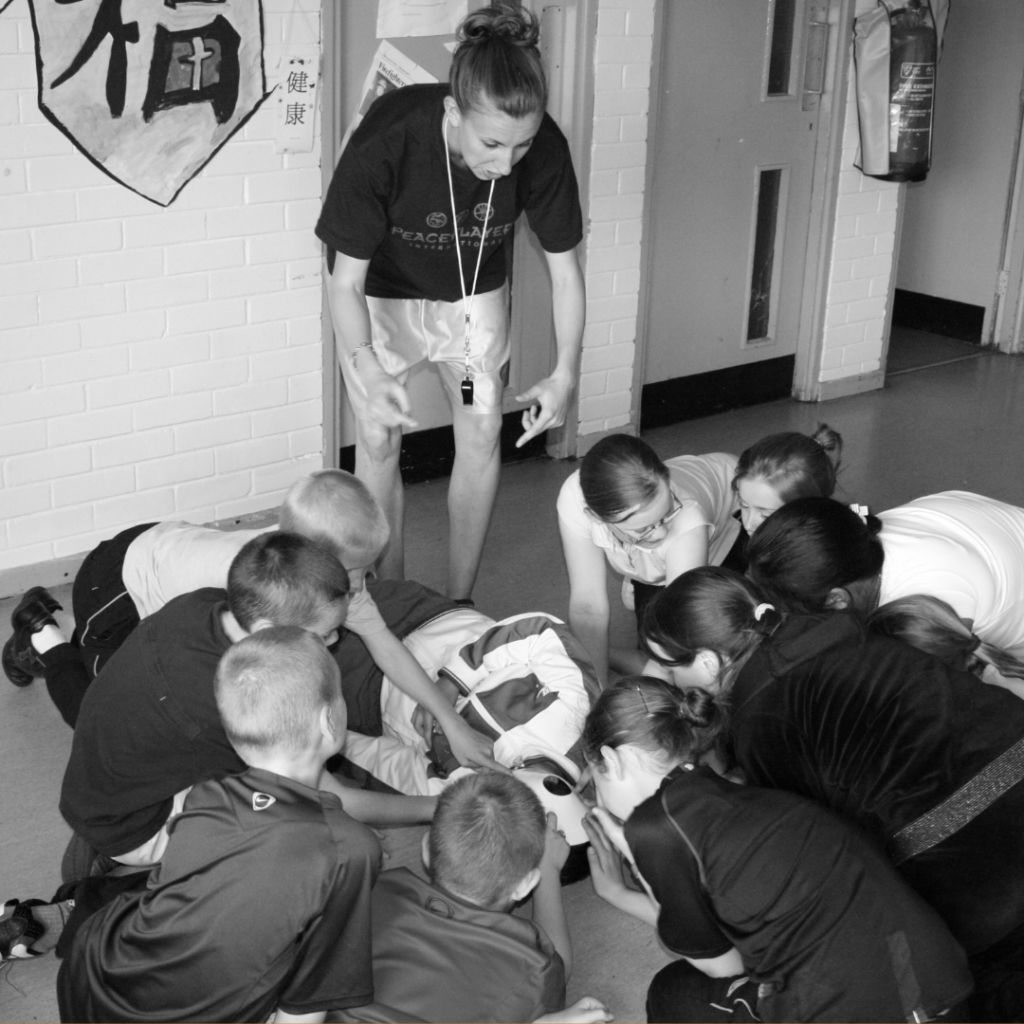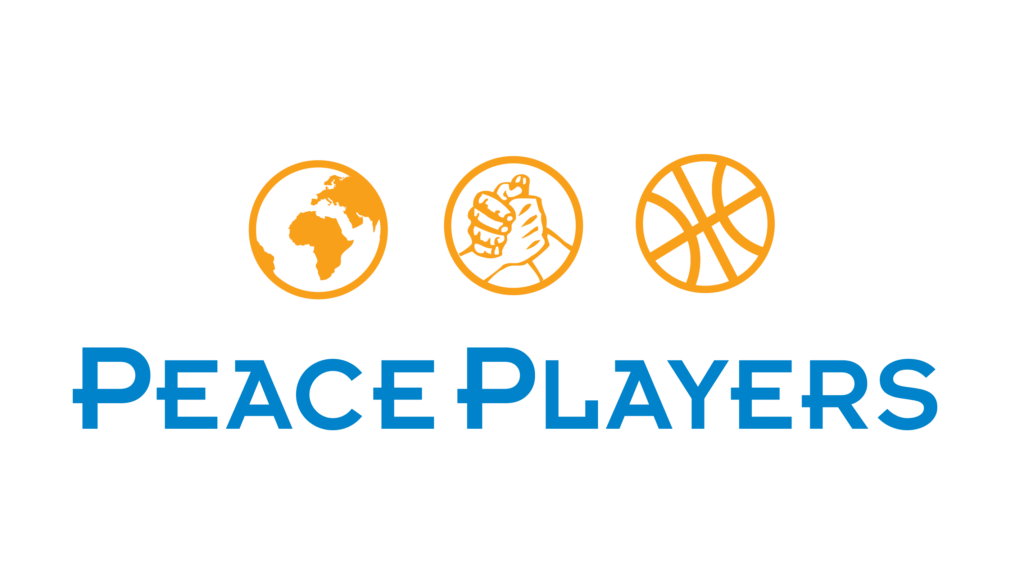How PeacePlayers Drove This Former Program Director to pursue a career in peacebuilding, facilitation, AND HOPE
Catching up with Ellen Cosgrove
November 8, 2021
SHARE
In celebration of PeacePlayers’ 20th Anniversary, we have had the pleasure of catching up with several “former” PeacePlayers. We have learned where their lives have taken them since their time with PeacePlayers, and how they’ve taken PeacePlayers into their careers, professional lives, interests and hobbies as they’ve moved through the world.
Q: Where do you currently live?
I currently live in Albany, New York right now. I grew up here and have lived in various other places, but was more recently in Brooklyn, NY. During the pandemic, I had to move, and I was like, “You know I think I'm going to go hang out with my family.”
Q: Which site were you working in?
PeacePlayers Northern Ireland, but I did get to visit the Middle East site during my time in Northern Ireland. My cousin Michael Vaughn Cherubin, he worked for them for four and a half years. He actually is who introduced me to PeacePlayers and told me I should do it. During my visit I got to participate in a twinning! That was a really cool experience to be able to be at a different site, and see the similarities [between sites] but also how incredibly different the context and the conflict was.

I was in Northern Ireland from February 2008 to July 2010.
I was a Program Director, but I believe, when I was leaving, the next group of Americans to come in were the first batch of Fellows. I think I was one of the last of the program directors before the title and role was switched to the fellowship. We were all in charge of our own kind of programmatic areas and then managing the relationships with parents, coaches, teachers, principles and community centres in those areas. But also, I managed the finances at the Belfast office and at one point I wrote a lot of grants. Especially when Gareth came in; I almost got to take more of a management role with him. He brought me into those conversations and gave me a lot of responsibility.
I actually immediately went to graduate school. I went to Brandeis University and I studied Coexistence and Conflict. I was actually thinking about going to social work school, that had been the plan, and then someone from the Georgetown [University] peacebuilding program contacted me when I was at PeacePlayers, and I was like, “wait a minute, i'm doing the work that the people are studying. Maybe I should invest in this.” So I found this program [at Brandeis] and applied. And it ended up that the program director of the program was from Northern Ireland and her [program director] husband knew Gareth [program director of PeacePlayers Northern Ireland]! It was really great, and it also was with practitioners from around the world. It was an incredible experience. I got to do my field project [as part of her graduate program] in Northern Uganda and Kenya, and I decided to do it using a sports based lens with youth. With youth and young men, and some ex-child soldiers. I figured that since I was going to a new context, I should focus on something that I have some familiarity with, and this would allow me to plug into these local programs as well.
A couple years ago I actually started my own project, called “Dinner and Dialogue” that uses food as a way to bring people together. I just think in all the travels I've done, all the people I've talked to in grad school, I learned the most about my Kenyan colleagues when we talked about what they ate for dinner. In Northern Ireland, I thought about the number of cups of tea and biscuits* I ate while listening to people's stories. So I created the “Dinner and Dialogue” project and ran it out of my home in Brooklyn. I had people over, and I'd write about a theme, and people would bring a dish around the theme. I would then facilitate a conversation around it. So I’m still doing a lot of facilitation work. Recently, I have started a consultancy called “Community In Context,” where I'm doing workplace team building and trust building activities. So I just started my own business, which is cool.
As for hobbies, I obviously love to cook. It's been cool to be upstate [New York] and be closer to nature. I've gotten to do more hiking and more kayaking, and last winter I got snowshoes to go snowshoeing. I grew up in the city [Albany], we didn't have huge backyards but my parents used to build an ice skating rink in our backyard when we were kids, so we decided to bring that back last year. So I did a lot of ice skating last year.
*biscuit = cookie
I think [the core values] are the prism through which I see the world. I think I can see the possibility for a better tomorrow. Especially right now, our country is so divided, people are so negative. I think being able to see people who had to hate each other for 700 years [pan-European Protestant and Catholic conflict], and Belfast is a community where families were affected by violence and potentially live four blocks away from those that committed the act. I saw these people who went through all this conflict have moments of connection. I think it gives me a little bit more hope with some of the really intractable or seemingly intractable challenges that our world faces. That if you give people the space to sit and talk and listen, misunderstandings can be cleared up.
I do think it's also just made me a better listener. I think I'm better at understanding people's different perceptions and different perspectives.
Good question. Probably when I was managing a team. I worked for a nonprofit, and we ran programming for middle schoolers in Harlem around human rights education, which was a really hard job. Managing my staff was really tough, too. It was similar to PeacePlayers; you're working with 20 year olds who were coaching younger people. The team I was managing were 22 year olds who are working with middle schoolers, and those 22 year-olds, they're not that far away from the kids we are working with. I definitely brought the knowledge that I gained with PeacePlayers to work with people from such different backgrounds to find common ground. I use those tools to find common ground among my staff. I brought some silly games, and I brought food. All to build trust with my staff and create some camaraderie, so that they were then able to feel like they were part of something and do their job better.
So there's a lot of good ones, but I think probably helping to build that relationship between [north Belfast primary schools] Holy Cross Girls and Wheatfield is my favorite. When I was first there, we were not even having the kids play together. We first did single identity work with both schools, and then the next year they agreed to let us bus them to a safe location, where we did a twinning. And then my last year, the last [twinning] I did with them, I actually walked the kids across the street. * Initially, there was some trepidation because when PeacePlayers first started working in these schools there was much more pushback from parents and the communities about bringing the kids from these two schools together to play. What was incredible was by the time we got to walking the kids across the street there were no issues and it just felt like a regular day. To me this shows that all the work that we did to build trust between these two schools and the surrounding communities paid off. Change is possible.
* important note, these two schools are directly across the street from each other. Holy Cross Girls serves students from an Irish/Catholic tradition, while Wheatfield serves those from a British/Protestant tradition. For the students of Holy Cross Girls to go to school they must walk or drive through an area that is predominantly British/Protestant. This led to increased tension, anti-social behavior, and protests for a number of years.
For greater context visit: http://newsimg.bbc.co.uk/1/hi/northern_ireland/1408337.stm
Follow along with Ellen Cosgrove and her endeavors by following her on Instagram @dinneranddialogue!





